The so-called "Factory 2.0"
Presented at Flock 2016 by @ralphbean.
Slides available at http://threebean.org/presentations/factory2-flock16/

The Eternal September
A fun tidbit of Hacker Lore:
Also called the September that never ended, the Eternal September is Usenet slang for a period beginning in September 1993, the month that Internet service provider America Online began offering Usenet access to its many users, overwhelming the existing culture for online forums.
The Second Eternal September
and the rise of github
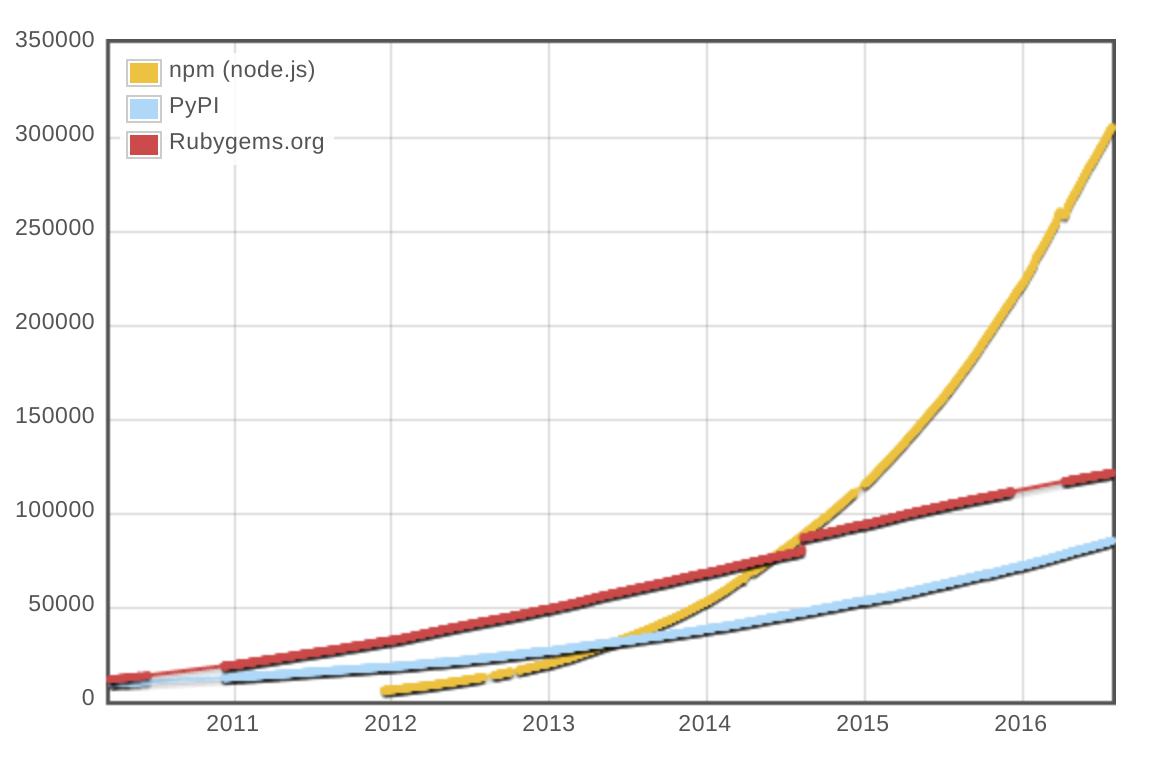
This is fine.
Consequent Changes
To application development and deployment:
pip freeze > requirements.txt # ship it!
To the traditional linux distribution:
- nixOS
- coreOS
- docker and friends
"Modularity",
briefly
- Matthew Miller started the conversation a few years ago.
- This has alternatively been called "Fedora Rings", "Envs and Stacks", and Alephs.
- Red Hat is now funding a team to see what we can do(!)
- Watch the recording of Langdon's talk that was here in this room just before lunch for the scoop.
But first,
How not to throw things over the wall
- In past Flocks we've talked about how to articulate "Red Hat things" in the Fedora space.
- I work for a group in Red Hat called PnT DevOps.
- Fedora Packagers ⇒ RH Platform Engineering.
- Fedora Infra ⇒ RH PnT DevOps.
- Let's be honest, and open. Let's worry less about "if Fedora is interested" and just share.
- All of this is a two-way street. Old habits die hard.
What Factory 2.0 is not
We had a problem from the outset. Lots of myths started to propagate about "Factory 2.0".
- Factory 2.0 is not a single web application.
- Factory 2.0 is not a rewrite of our entire pipeline.
- Factory 2.0 is not a silver bullet.
- Factory 2.0 is not a silver platter.
- Factory 2.0 is not just Modularity.
- Factory 2.0 is not going to be easy.
the same "thing"
under different interpretation
... and why it took us so long to get here.
How long ago was it that we started talking about the Rings proposal?
- Does Modularity mean anything with Factory 2?
- Does Factory 2 mean anything without Modularity?
the six problem statements
(we made a list)
- Repetitive human intervention makes the pipeline slow.
- Unnecessary serialization makes the pipeline slow.
- The pipeline imposes a rigid and inflexible cadence on products.
- The pipeline makes assumptions about the content being shipped.
- The distro is defined by packages, not “features” (Modularity).
- There’s no easy way to trace deps from upstream to product.

If we had problems before...
...they're about to get a lot worse.
- Remember the lego blocks analogy? Imagine Modularity without Factory2.
Dependency Chain
Problem Number 6
There’s no easy way to trace deps from upstream to product (through all intermediaries).
- We can model deps of RPMs today, kinda.
- We can model deps of docker containers in OSBS.
- productmd manifests produced from pungi contain the deps of all our images.
So, that's great. But there's no easy way to traverse deps all the way from upstream component to end artifacts.
Let's expand pdc-updater.

And then we can use that data for great justice.
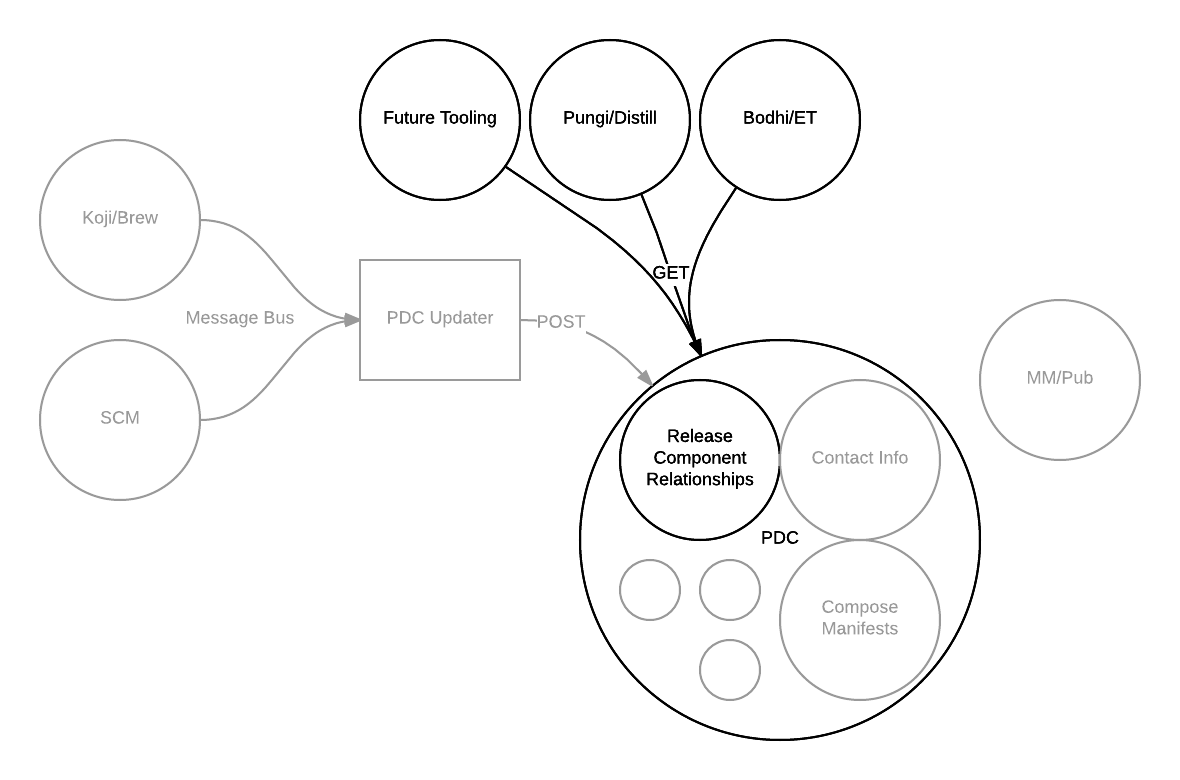
Pipeline Serialization
Problem Number 2
Unnecessary serialization makes the pipeline slow.
This is less a problem for Fedora's Infrastructure than it is for the internal PnT DevOps environment: things happen, unnecessarily, in serial.
One big piece we (will) share here is the Openshift Build Service (OSBS) for building containers. We're going to need to crack the autosigner.py nut to get around new problems (assuming we "go big" with containers).
Internally we're going to be using a special build key for this -- which we'll treat as semantically different from the gold key. Let's consider doing the same in Fedora.
Automating Throughput
Problem Number 1
Repetitive human intervention makes the pipeline slow.
This one can cover a lot of ground.
- Rebuild automation.
- Compose automation.
- Release automation.
Automating Throughput
Rebuilds and Composes
Builds:
- For this we'd like to build a workflow layer on top of koji called "the orchestrator" (or, the build orchestrator).
- The concept was originally confused with modularity-specific considerations, but we'd like it to be more general.
Composes:
- Take pungi and break it out into an ad hoc process alongside the buildsystem.
- In the best scenario, compose artifacts are built before we ask for them.
Automating Throughput
Releases
- We can do two-week Fedora Atomic Host releases now. Hooray!
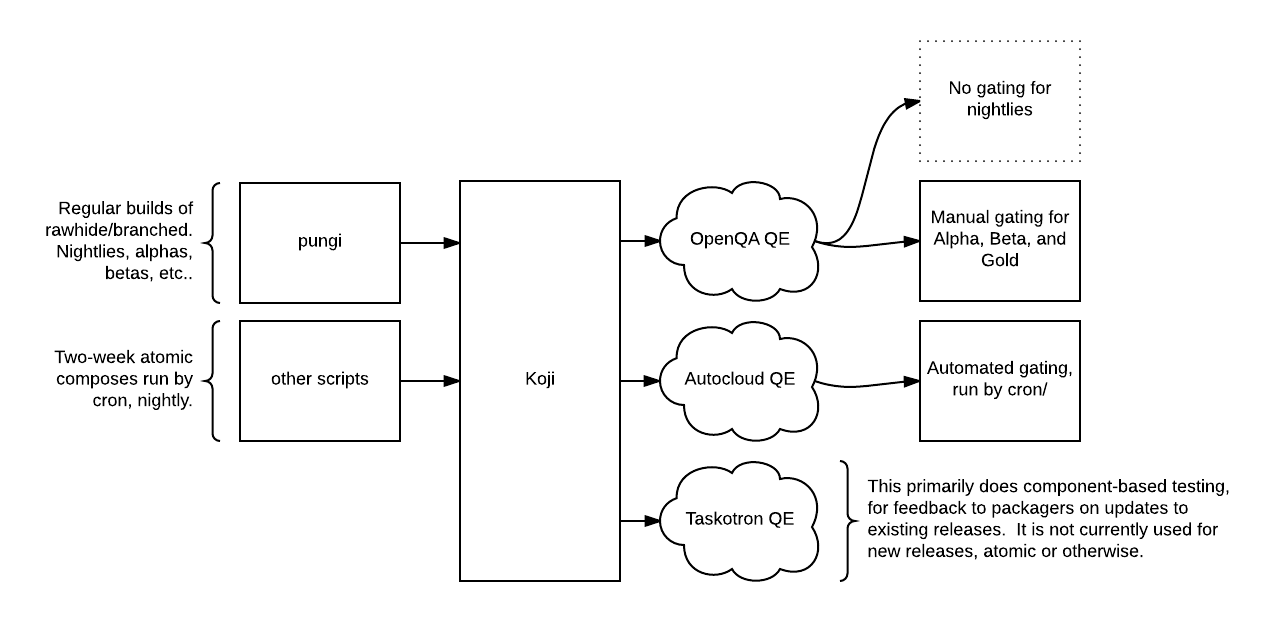
- Can we reconcile that with the mainline compose/QA/release process?
- The problem is much more intense for Red Hat just due to volume.
- We have uncovered ground in Bodhi for automation. The karma system is a predecessor, but it relies on humans. Can we fast-track some components based on taskotron results?
- How can we specify an (automated) policy for setting difference release cadences? (without hard coding it)
Flexible Cadence
Problem Number 3
The pipeline imposes a rigid and inflexible cadence on "products".
Releases:
- Related to the previous point about Automating Releases.
- In the first analysis, "the pipeline is as fast as the pipeline is."
EOL:
- Think about the different EOL discussions for the different Editions.
- Beyond that - a major goal of modularity is "independent lifecycles". What does that mean in practice?
Let's talk about pkgdb2 and its collections model.
Modularity
All Roads Lead to Rome
The distro is defined by packages, not “features”.
- There are some specific things about modularity (module build service, BPO, etc...)
- Really, this is where we tie all the threads together. Each has a certain value on its own, but if we can't "do modularity" it won't have the same effect.
Building Modules
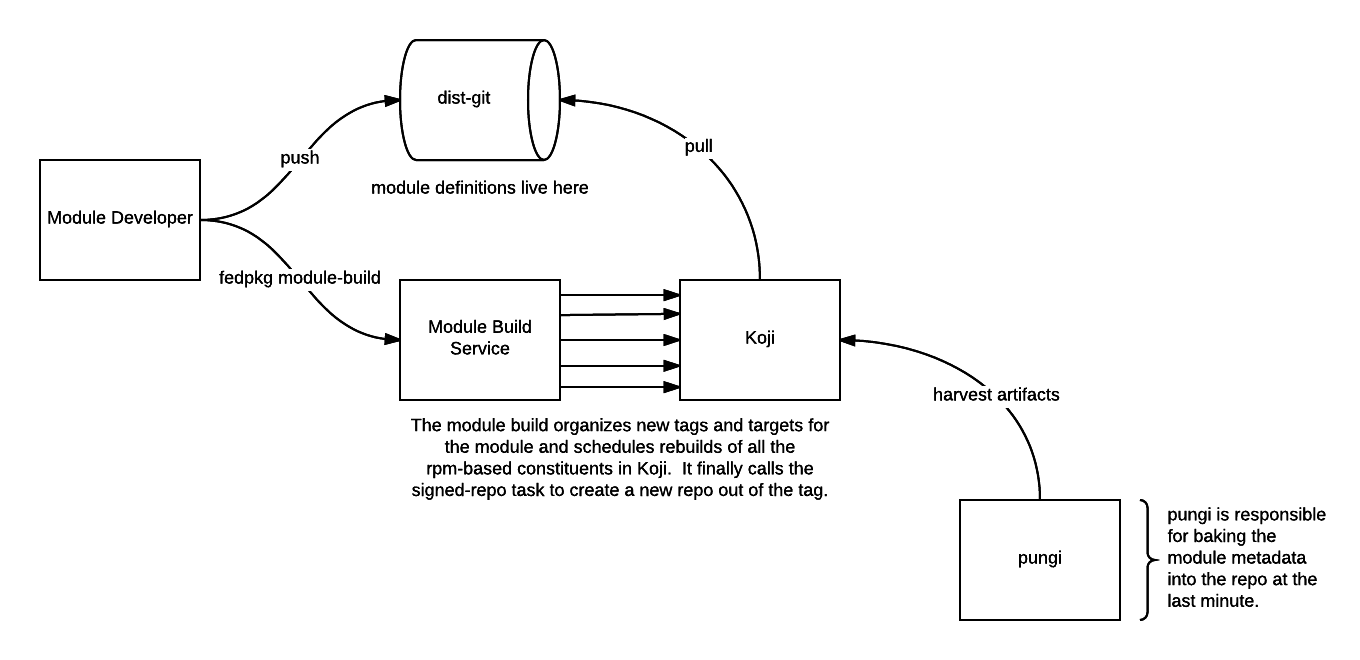
- Let's go visit the Modularity Infrastructure page.
- Then, let's go visit the dev instance of the build pipeline overview app.
Artifact Assumptions
Problem Number 4
The pipeline makes assumptions about the content being shipped.
- Remember we asked some Red Hat stakeholders what they wanted out of a next generation pipeline? There were some real gems in there.
- My favorite was:
"I want to be able to build any content, in any format, without changing anything."
this is fine
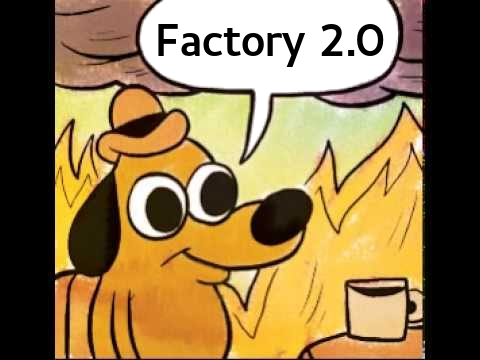
Artifact Assumptions
Problem Number 4
- This one is an odd duck among the problem statements. Qualitative - not quantitive.
- Do we have to do gymnastics every time we add a new format? Or can we make that easier over time.
- Autocloud and two week atomic
- OSBS.
- Flatpak, snaps, rocket containers, etc...
- We can do anything. But how easily can we do it?
- Which leads us to....
The pernicious hobgoblin
of technical debt
- Microservices (consolidate around responsibility!)
- Reactive services
- Idempotent services
- Infrastructure automation
Thank you
- There's an opportunity to do something very cool with how we make the distro.
- Please tell me where I'm wrong.
- Hop in #fedora-modularity and #fedora-admin to join the party.
Questions?
Presented at Flock 2016 by @ralphbean.
Slides available at http://threebean.org/presentations/factory2-flock16/
